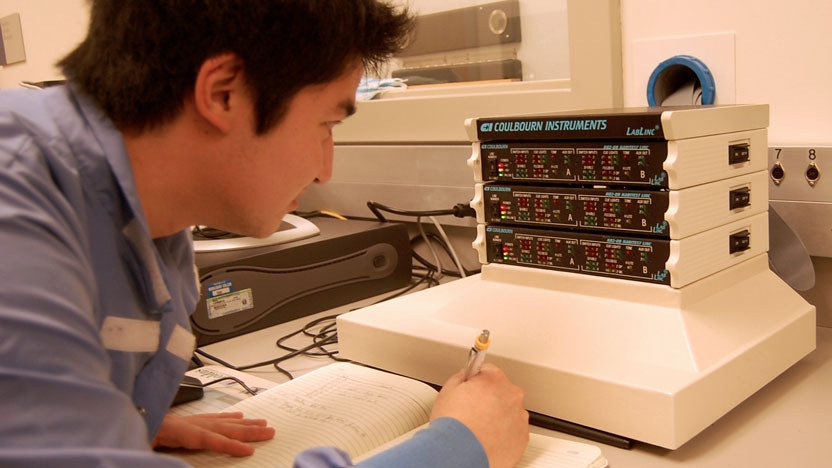Research Labs

Language and Cognition Lab
We explore how language shapes thought, perception, and cognitive processes. Our research focuses on bilingualism, language acquisition, and the cognitive mechanisms underlying linguistic processing. We use experimental methods, including eye-tracking and behavioral studies, to examine how individuals process and retrieve words, navigate multiple languages, and adapt to different linguistic environments. Our work contributes to understanding of language processing and its broader implications for cognition and education (Parshina).
Adolescent Identity Lab
The lab investigates the intersection of multiple identities with a focus on how social and emotional development influences adolescents’ sense of self and health seeking decisions. (Moeller)
Social/Emotional Regulation Lab
Our research explores how emotions alter individual and social responses. We investigate the impact of emotion regulation on endophenotypes of addiction such as impulsivity. We also explore how emotional carry over effects influence social dynamics and prosociality. Current projects use mindfulness interventions to improve emotion regulation and self-control abilities. Our studies assess the degree to which enhanced regulatory abilities lead to healthier responding during social-emotional challenges. Outcome measures include behavior as well as psychophysiology measures such as EEG, hormone analyses, heart rate variability, and skin conductance responses. (Cronise)
Behavioral Genetics Lab
Our research examines the genes and neurobiological pathways associated with stress, anxiety, and substance abuse using mouse models. (Parker)
Behavioral Neurophysiology Lab
Our lab investigates the effects of spontaneous brain activity on both brain function and brain physiology. By simultaneously monitoring electrical/chemical indices of brain activity along with behavior, we aim to understand the neurophysiological underpinnings and consequences of fundamental behaviors such as sleep and learning/memory. (Dash)
Child Clinical Lab
Our research focuses on interpersonal and motivational processes that help children thrive in their family, school, and other contexts. (Gurland)
Children’s Memory Lab
The lab investigates how adult behaviors (e.g., questioning style or rapport development) relate to the quality of children’s reports of an experienced event, and has applications to forensic, educational, and medical settings. (McCauley)
Clinical Psychophysiology Lab
The lab investigates the behavioral, peripheral, and central correlates of anxiety and anxiety disorders using eye tracking, event related potentials, and measures of peripheral autonomic activity.(Kimble)
Conservation Psychology Lab
The lab assesses psychology’s role in understanding and predicting pro-environmental behaviors. Current work investigates the extent to which social norms, self determination theory, and childhood experiences predict the likelihood of engaging in pro-environmental behaviors. (McCauley)
Educational Psychology & Adolescent Development Lab
One line of our research investigates the epistemological development of adolescents, or what adolescents believe about knowledge and knowing, and how that relates to learning and education. A second line of work examines communication with parents during adolescence and emerging adulthood, and the development of autonomy and self-regulation. (Hofer)
Human Memory Lab
Our lab examines the mental processes that underlie human memory. Current projects seek to understand the nature of memory errors, the influence of emotion on memory, how taking a test (as opposed to just studying) can improve long term memory, and how social processes influence memory. (Arndt)
Risk-Taking Analysis & Prevention Lab
The lab investigates risk-taking behaviors in college students, emphasizing the causes and consequences of alcohol consumption as well as sexual risk-taking, including casual sex and protective behaviors. (Velez)
Self-Regulation & Addiction Lab
This lab investigates the development of self-regulation and its neural correlates among at-risk youth, as well as their contribution to substance/behavior addictions by using neurocognitive test batteries, structural and functional MRI, and modeling. (Zhai)
Sexuality Lab
Our research primarily explores the human experience of sexuality, including the psychological, physiological, behavioral and cultural aspects of sex. We use experiments as well as self-report and implicit measures to understand sexuality in context, and seek to translate this knowledge into interventions to reduce distress about sexuality. (Seehuus)
Solitude and Identity Lab
Our lab examines the inner lives of individuals. We are interested in understanding and describing the introspective and emotional processes that take place when people are alone with themselves. Research in this lab is theory-driven with an aim toward generating tools, skills, and practices that people can use in their everyday lives to increase their self-understanding and well-being. Current projects include identifying the developmental functions of solitude throughout the lifespan, designing and testing a solitude skills intervention program for a variety of populations from adolescents to older adults, and investigating the identity processes that occur when individuals study, work, or live abroad. (Thomas)
Spatial Cognition Lab
Our research investigates factors influencing cognitive abilities, particularly spatial skills. Some issues of interest: how do people ‘pay attention’ to their environment, strategies used, the influence of stressors, the role of social influences such as stereotypes, and relationships to hormones.(Collaer)
